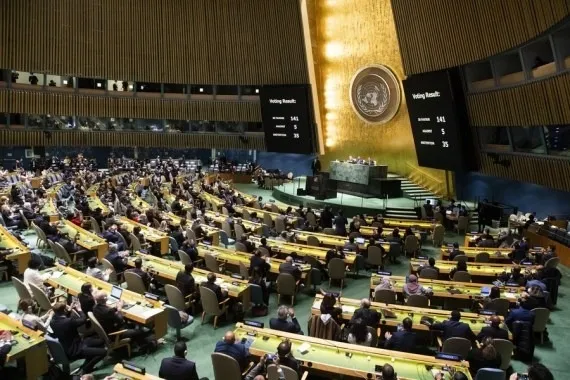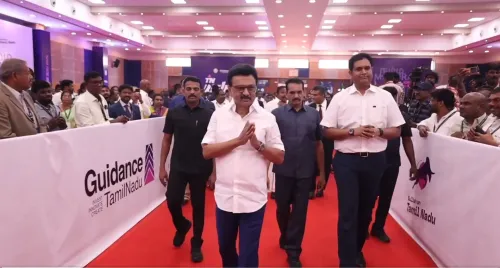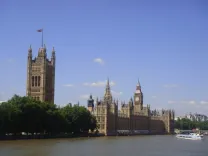India Abstains on Ukraine Resolutions; US Aligns with Russia

Synopsis
Key Takeaways
- India's abstention highlights its neutral stance.
- The US diverged from Western allies, supporting Russia on some resolutions.
- Western nations condemned Russia as the aggressor.
- Significant drop in voting numbers compared to previous resolutions.
- The US seeks a peace deal with Russia.
United Nations, Feb 25 (NationPress) India chose to abstain from a series of resolutions concerning Ukraine and their amendments during the General Assembly session. This marked a notable moment where the US diverged from its Western allies, aligning with Russia on some resolutions, highlighting the ongoing shifts and realignments under President Donald Trump.
On the third anniversary of Russia’s invasion on Tuesday, Western nations successfully passed two resolutions that identified Moscow as the aggressor in the Ukraine conflict.
In an unusual turn of events, the US voted against a resolution proposed by Ukraine and its Western allies that condemned Russia’s invasion, a move that was complemented by China’s abstention.
The resolution passed with 93 votes in favor, 18 against, and 65 abstentions.
The votes were notably lower compared to the 141 votes secured for a similar resolution in 2023, which also saw India abstaining.
A resolution backed by Washington, which did not label Russia as the invader, was revised through the initiative of Western countries to explicitly identify Moscow as the aggressor in Ukraine. The US expressed dissatisfaction and abstained from voting on its own resolution after amendments proposed by France’s Permanent Representative Nicolas De Riviere were adopted during President Emmanuel Macron’s visit to Washington.
The US, which is currently in discussions with Russia about a peace deal for Ukraine, perceives the condemnation of Moscow as a potential hindrance to its diplomatic efforts. Trump has communicated with Russia’s President Vladimir Putin, and US representatives have met with Moscow in Riyadh to seek an end to the war that began on February 24, 2022, severely impacting both Ukraine and Russia.
Secretary of State Marco Rubio defended the decision not to assign blame, describing it as “a simple, historic resolution” aimed at creating “a path to peace”.
During her address at the Assembly, acting US Permanent Representative Dorothy Shea remarked that prior resolutions condemning Russia “have failed to halt the war”.
She emphasized that the current resolution “looks forward, not backwards”, framing it as “a moment of truth -- a historic moment”. She asserted, “This has never been about Ukraine” and outlined that the resolution aims to address the global ramifications of the conflict.
The Russia-sponsored amendment to Ukraine’s resolution, which sought to include the “root causes” of the conflict, was unsuccessful, with the US abstaining. It garnered only 31 votes in favor, while 71 voted against it and 59 abstained.
Amendments proposed by France to invoke the UN Charter and condemn Russia’s invasion were adopted, despite negative votes from both Washington and Moscow.










